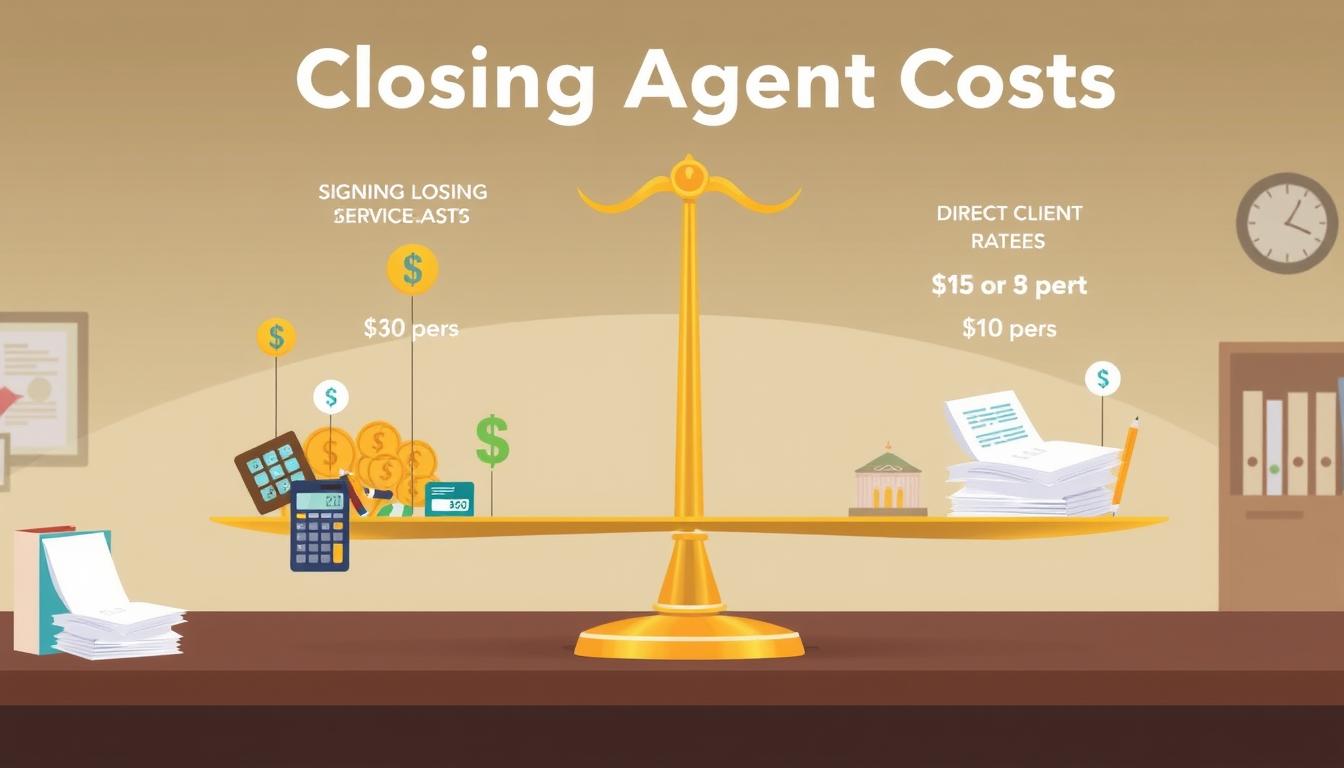How Much to Pay Loan Signing Agent: Rates & Fees Guide
I used to work as a mortgage officer. I saw how important loan signing agents are. They make sure real estate deals go smoothly and on time. But figuring out their fees and rates can be tricky.
In this guide, I’ll explain the industry standards and best practices. I’ll also share strategies to help you choose the right loan signing agent. This way, you can make smart choices.
Key Takeaways
- Loan signing agents can earn between $75 and $200 per appointment, depending on the source of their business.
- Signing services typically pay $75-$100, while direct clients like escrow officers, mortgage officers, and real estate agents may pay $150-$200.
- Factors affecting fees include appointment source, printing costs, and travel expenses.
- A simple, consistent fee structure is preferred by clients and can lead to more business opportunities.
- Compliance with TRID disclosure requirements is crucial when setting pricing strategies.
Understanding Loan Signing Agent Services
Loan signing agents are notary publics in the real estate world. They help with signing loan documents. They check who’s signing, witness signatures, and make sure everything is done right.
Role and Responsibilities
These agents focus on notarizing loan documents like mortgages and deeds of trust. They make sure everything is signed correctly and on time. This helps prevent fraud and keeps the process clear.
Required Qualifications and Certifications
To be a loan signing agent, you need to be a notary public first. You must complete training and pass exams. Many also get extra training for loan document handling.
Essential Equipment and Supplies
Loan signing agents need a dual tray laser printer, paper, and ink. They might also have insurance and a car for appointments. If they work directly with clients, they might not need printing stuff.
Loan signing agents are key in the real estate world. They make sure loan documents are correct and legal. They also offer a safe and easy service for everyone involved.
How Much to Pay Loan Signing Agent: Standard Fee Structure
The cost to pay loan signing agents can change based on where they get their work. Usually, they charge between $75 to $100 for each job. But, if they work directly with clients, they might ask for $150 to $200.
It’s smart to have a fixed price for their services. This way, you avoid confusion over how much to pay. A good rate is $90 to $100 for signing jobs and $150 for direct client work.
| Service Type | Typical Fee Range |
|---|---|
| Signing Service | $75 – $100 per appointment |
| Direct Client | $150 – $200 per appointment |
Keeping fees the same helps loan signing agents be clear with their clients. It also makes sure they get paid fairly. This builds trust and helps both sides feel good about the deal.
Remember, the exact fees can differ. This depends on things like where they work, how much experience they have, and the market. But, the ranges given are a good starting point for what to expect.
Signing Service vs. Direct Client Rates
Loan closing agent costs can differ a lot. This depends on whether you work with a signing service or directly with clients. Signing services usually pay $75-$100 per appointment. They take a cut to find and assign the job. On the other hand, direct clients like escrow officers may pay $150-$200. This lets agents keep 100% of the fee.
Working directly with clients has clear benefits. You earn more money and don’t have to worry about printing costs. Plus, you might get more consistent work. But, signing services can offer a steady flow of appointments. This is great for new loan closing agents who are trying to grow their client base.
| Fee Structure | Signing Service | Direct Client |
|---|---|---|
| Fee Range | $75 – $100 | $150 – $200 |
| Expenses Covered | Printing, Mileage | Agent Responsible |
| Payment Terms | 2 weeks to 90 days | Few days to 45 days |
Signing services can offer a steady flow of work. But, more experienced loan closing agent costs and escrow agent fees for loans often prefer direct client work. This way, they can keep all the fee and earn more. It helps them make their business more profitable and sustainable.
Factors Affecting Loan Signing Fees
As a professional loan signing agent, it’s key to know what affects your fees. The source of your business is a big factor. But other things also play a role in setting fair pay.
The distance to travel, the time of day, the number of signers, and the complexity of documents all matter. But experts say not to use a sliding fee scale. It might mean fewer jobs.
Instead, set a flat fee that covers the average costs of your work. This way, you get paid fairly and your clients know what to expect.
| Factor | Consideration |
|---|---|
| Source of Business | Signing services pay $75-$100 per job, while direct clients offer $150-$200. |
| Travel Distance | Longer trips might need extra fees for gas and time. |
| Time of Day | Jobs during busy hours or weekends might cost more. |
| Number of Signers | More signers mean more work, so you might charge more. |
| Document Complexity | Complex documents, like for reverse mortgages, might cost more. |
As a loan signing agent, your time and skills are worth a lot. A fair and steady fee helps you get paid right. It also makes your clients happy.
Understanding TRID Disclosure Requirements
As a loan signing agent, knowing the TRID rules is key. These rules were made in 2015 to make disclosures clearer. They help ensure everything is fair and transparent for everyone involved.
Legal Fee Disclosure Rules
One important rule is about showing signing fees to borrowers. These fees can’t change after they’re shown. This rule helps keep things fair and honest for everyone.
Impact on Pricing Strategy
The TRID rules affect how you price your services. Fees are set when the Closing Disclosure is given. You need to price carefully to meet these rules and keep clients happy.
Compliance Considerations
Following TRID rules is crucial for loan signing agents. Keeping up with new rules helps avoid legal trouble. Make sure to focus on TRID disclosures and loan signing legal requirements in your strategy.
“The TRID rule took effect in 2015 to harmonize the Real Estate Settlement Procedures Act (RESPA) and Truth in Lending Act (TILA) disclosures and regulations.”
Understanding TRID rules helps loan signing agents. They can handle pricing and compliance better. This ensures a smooth and professional experience for clients.
Breaking Down Cost Components
As a loan document signing agent, it’s key to know the different costs that affect your pricing. These costs help you offer top-notch services and keep your business running smoothly.
The main costs for loan document signing services are:
- Printing Costs: Loan packages can have 100 to 300 pages. Printing costs are about $0.008 to $0.01 per page. For a 150-page package, printing costs are around $64.60.
- Travel Expenses: Travel to and from signings costs $10 to $15 per trip.
- Insurance: Errors and Omissions (E&O) insurance for Notary Signing Agents costs $20 to $175 a year. This depends on the coverage.
After subtracting these costs, a $100 signing service can make about $80 to $85 profit. A direct client appointment at $150 can make $135 to $140 profit. This is because there are no printing costs.
There are also other costs like phone bills, office equipment, notarial stamps, and ads. These costs can affect how much you make from your services.
“Understanding and carefully managing the cost components of your loan document signing services is essential for maintaining a profitable and sustainable business.”
By understanding these costs, loan signing agents can set fair prices. This way, they can make a good profit while still offering great value to clients.
Multiple Loan Signing Fee Structure
As a loan signing agent, knowing the fee for handling multiple loans is key. Experts say to charge $50 extra for a second loan. And $75 extra if you work with an escrow company. This extra money is for the extra time and complexity of managing more documents.
First and Second Loan Pricing
The first loan signing fee is usually between $75 and $125 with a signing service. And $125 to $200 for direct clients from escrow offices. For a second loan in the same meeting, charge $50 extra for signing service clients. And $75 extra for direct clients.
Additional Document Handling Fees
Loan signing agents might also charge more for lots of documents. This is for the extra time and effort to review and organize them. By setting fair extra fees, agents get paid for their hard work.
“The median per capita income in the US is a little over $31,000, whereas notary loan signing agents can potentially surpass this income with just a few loan signings per week.”
Common Pricing Mistakes to Avoid
As a loan signing agent, it’s key to steer clear of common pricing errors. One mistake is using a complex fee system based on rush hour, travel distance, or the time of month. This can scare off clients and make you seem unprofessional. Another error is taking low offers ($60-$75) from signing services, which underprices your skills and services.
Instead, aim for a fair, steady rate that you’re okay with. Seek direct client work for better pay. By dodging these pricing traps, you can build a stable and profitable loan signing agent business. The goal is to offer top-notch service while making sure you’re fairly paid for your work.
- Avoid complex fee structures based on factors like rush hour, travel distance, or time of month
- Refrain from accepting low-ball offers ($60-$75) from signing services
- Establish a fair, consistent rate that you’re comfortable with
- Prioritize direct client work for higher earnings
Industry expert Marcy Tiberio, the 2015 Notary of the Year, stresses the need for these pricing strategies. “Loan-signing jobs now take longer, and documents are bigger than ever. Loan signing agents must charge a fair rate that matches the time and skill needed for these complex tasks,” she says.
| Mistake | Impact |
|---|---|
| Complex fee structure | Fewer appointments, unprofessional appearance |
| Accepting low-ball offers | Undervalues expertise and services |
| Inconsistent or low rates | Unsustainable business model |
By avoiding these common pricing errors, loan signing agents can set themselves up for lasting success. They ensure their services are valued by clients. Keeping a fair, consistent pricing is vital for a thriving loan signing agent business.
Conclusion
Successful loan signing agents keep their fees simple and consistent. For signing services, they charge $90-$100. When working directly with clients, they aim for $150 per signing.
It’s best to avoid complicated pricing. Instead, focus on building strong relationships with clients. This can lead to higher earnings. Knowing TRID rules and being professional are also crucial for success.
By following these tips, loan signing agents can make more money and help their clients. They can work through signing services or directly with escrow offices. A clear pricing model is key to a successful career.
The how much to pay loan signing agent question is about finding the right balance. It’s about offering fair rates for their expertise and services. This way, loan signing agents can achieve long-term success and financial stability.
FAQ
What is the typical range for loan signing agent fees?
Loan signing agents can make $75 to $200 per signing. This depends on where they get their work. Signing services pay $75-$100, while direct clients like escrow officers pay $150-$200.
What are the qualifications and equipment required to become a loan signing agent?
To be a loan signing agent, you need to be a notary public. You might also get extra training. You’ll need a printer, paper, and ink for signing services. Insurance and a reliable car are also key. Direct clients might not need printing equipment.
What is a standard fee structure for loan signing agents?
Fees for loan signing agents vary. Signing services pay $75-$100, while direct clients pay $150-$200. A common fee is $90-$100 for signing services and $150 for direct clients.
What are the benefits of working directly with clients versus signing services?
Working directly with clients like escrow officers can pay $150-$200. This means you keep all the fee. It offers higher pay and no printing costs. Yet, signing services can give new agents a steady flow of work.
What factors can affect loan signing agent fees?
Several things can change fees. These include the source of work, travel distance, and time of day. But, experts say not to use these to adjust fees. It might lead to fewer appointments.
How do TRID rules impact loan signing agent pricing?
TRID rules require lenders to list signing fees on the final closing disclosure. These fees can’t be changed after disclosure. Loan signing agents should know these rules to avoid issues.
What are the common cost components for loan signing agents?
Loan signing agents have several costs. These include printing, gas, and insurance. After these costs, a $100 signing service appointment leaves about $80-$85 profit. Direct client appointments at $150 can leave $135-$140 profit, with no printing costs.
How should loan signing agents price multiple loan signings?
For first and second loan signings, extra fees are okay. Experts suggest an extra $50 for a second loan with signing services. For escrow companies, it’s $75 extra. This covers the extra time and complexity.
What are some common pricing mistakes to avoid as a loan signing agent?
Avoid complex fee structures and low-ball offers. Set a fair, consistent rate. Seek direct client work for better earnings.





